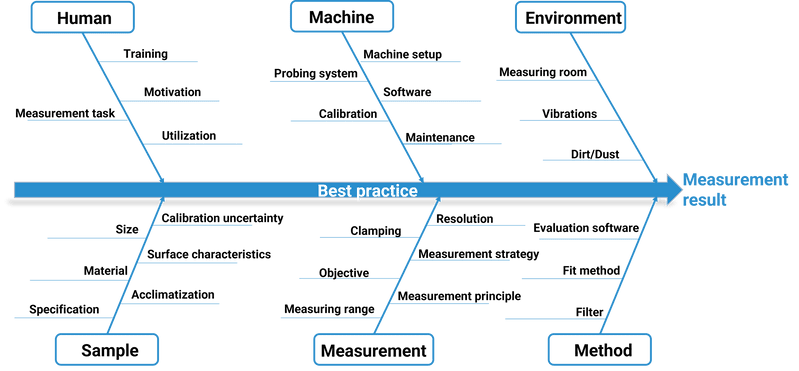Blog
测量系统分析(MSA)是现代计量学中的核心要素之一,因为它决定了一个测量系统是否具备可靠且准确执行测量任务的能力。
在生产环境中,测量结果是质量判定与决策的基础。
如果测量系统本身不具备足够能力,即使是最先进的制造工艺,也无法从根本上保证产品质量。
为了评估测量设备与测量过程的能力,通常会在真实生产条件下采用多种分析方法。
这些方法包括重复测量,例如:
这些分析通常被称为 Gage R&R(重复性与再现性)。
根据行业与相关标准的不同,以下要素可能有所变化:
在实际应用中,测量过程能力通常通过 Cg 和 Cgk 两个指标来评估。
具体而言:
在许多工业领域,测量系统必须满足以下要求:
Cg / Cgk > T
其中公差系数 T 取决于:
基本原则是:
Cgk 数值越高,测量系统的性能与可靠性越强。

T ... 图纸上的公差
S ... 测量的标准偏差
xg- xm.... 相对于参考值的测量偏差
在实际生产中,测量能力并不仅仅取决于测量设备本身。
典型影响因素包括:
这些原因可以通过 石川图(鱼骨图) 进行直观展示与分析。

MSA 能够说明测量系统是否具备能力,
但并不能自动回答一个关键问题:
👉 如何有针对性地提升测量精度?
如果希望不仅评估测量性能,还要实现系统化优化,就需要更深入地研究影响因素与相关测量技术。
我们的白皮书将为您提供实用指导,帮助您系统性提升测量精度并有效减少误差来源。
您将了解:
无论您已具备计量经验,还是刚开始接触该领域,本指南都能为您提供提升精度、重复性与过程稳定性的可行策略。
👉 立即下载白皮书
提升测量精度 · 增强重复性 · 强化过程可靠性